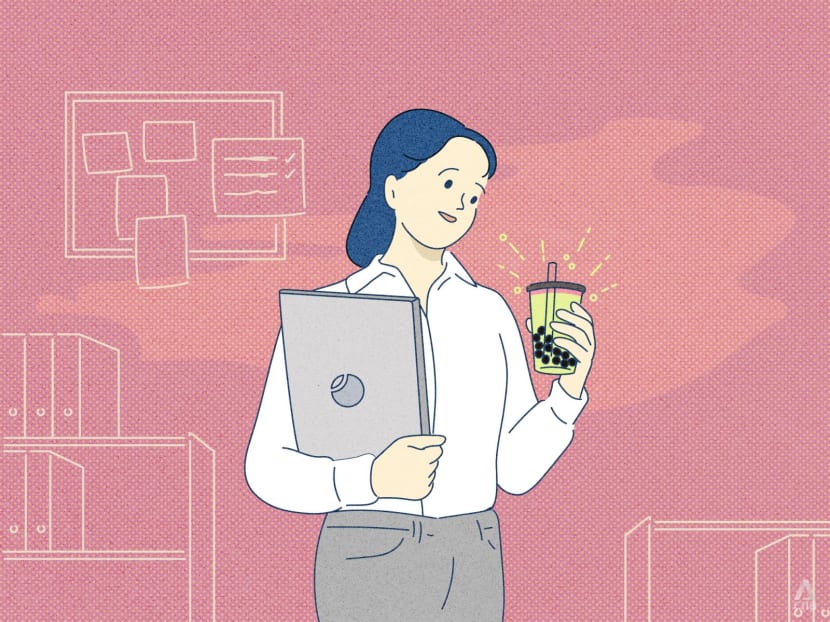Your craving for sugar or caffeine and what it reveals of how you cope with stress
A sugary snack or caffeinated drink can be a shortcut to cope with stress, but it could prevent the person from learning how to process stress and manage one’s emotions in healthier ways.

You can become too psychologically dependent on sweet treats or that must-have coffee to get you through your work day when it crosses the threshold into “emotional eating”, a health expert said. (Illustration: CNA/ Samuel Woo)

This audio is generated by an AI tool.
It is 3pm on a weekday and the post-lunch slump hits hard. Right on cue, a colleague chimes in with the familiar refrain: “Anyone want bubble tea?”
No, I might initially protest, mostly out of a vague sense of health consciousness or guilt from the overpriced caffeinated drink I already bought that morning. Then, someone always coaxes: “It’s okay, just treat yourself.”
It rarely takes much convincing. I cave, like clockwork, and end up reaching for a chocolate waffle, a fizzy drink or maybe a tiny pack of chips to push through a particularly tedious task.
We tell ourselves it’s all right in moderation, that these little indulgences serve a purpose. After all, what is a little sugar or caffeine if it gives us the jolt we need to power through the day?
Yet, more often than not, I’ve reached the bottom of the cup or the last bite of a snack before I’ve even finished the task for which I needed that boost.
This begs the question: Is this “treat” truly helping? Or have we trained ourselves to believe that it does?
I turned to a dietitian and psychologists to find some answers.
When does a reward become a crutch? And are there better ways to lift our mood or productivity without needing to unwrap a snack or grab a cup of latte?
PHYSICAL BENEFITS FROM “TREATS”
First, the positive news. The health experts said that going for the occasional snack does offer a real, physiological boost – at least in the short term – but it depends on the type and portion of the “treat”.
Ms Annabelle Johnson, an accredited dietitian in private practice here, said that consuming sugar can stimulate the brain’s “reward system”, leading to a release of dopamine and feeling of pleasure.
A moderate intake of beverages containing caffeine such as coffee and tea may also carry health benefits and lead to a productivity boost, she added.
For example, a cup of espresso might help someone who had a poor night’s sleep to focus better at work, though reaching for a third or fourth cup of coffee is likely to be excessive.
“Caffeine is a stimulant that works in the brain. It can increase alertness in many people, though the effect differs between individuals and the dose of caffeine,” Ms Johnson said.
However, she cautioned that excessive intakes of sugar can be associated with unstable blood sugar and in turn, unstable energy levels, while excessive caffeine intake can lead to anxiety, heart palpitations and insomnia.
Ms Ooi Sze Jin, founder and psychologist at mental health social enterprise A Kind Place, said that the benefits gained from snacking for an energy boost is “definitely not just placebo”.
The not-so-positive news is that our bodies may negatively adapt to the physical effects of relying on such snacks.
Ms Ooi pointed out that caffeine may block “sleepy signals” in one’s brain but also constricts blood vessels.
“With regular use, your brain adapts to this. When you don't have caffeine, those vessels dilate, which is a key reason for withdrawal headaches,” she added.
“So there are genuine physical effects, but the habit and expectation create a strong psychological pull that can feel like a need even when the physical boost isn't as strong.”
FILLING A PSYCHOLOGICAL NEED
Indeed, beyond the physical effects that an afternoon cuppa provides, what often keeps the habit going is the psychological boost that these “treats” give, the health experts said.
Mr Muhammad Haikal Jamil, founder and senior clinical psychologist at ImPossible Psychological Services, said that turning to daily sweet treats usually performs “an emotional function instead of a physiological one”.
Eating confectionery may fulfil an emotional need to feel rewarded and satisfied. It can also be a way to self-soothe during periods of stress, providing a temporary emotional lift, he added.
“Even though we may be feeling stressed, treating ourselves provides us with a sense of control in our ability to improve our mood. Enjoying the sweet treat also provides a window for us to take a break away from the stressors faced.”
Ms Ooi the psychologist said that a sugary snack or caffeinated drink can be a learned shortcut to cope, but the person would not learn how to process stress and manage one’s emotions in healthier ways.
“A healthy treat is a conscious, occasional reward or pleasure. A crutch is used to escape or numb feelings, often leading to guilt later and preventing you from building better coping skills.”
Though snacking may not be a greater cause for concern compared to other coping strategies for stress such as substance abuse, Mr Haikal emphasised the importance of moderating any coping strategy that one adopts, even beneficial ones such as exercising.
“Over-reliance on a certain coping strategy usually occurs as a result of our attempt to escape an overwhelming stressor. However, we are not addressing the issue or developing our ability to overcome them,” he added.
In my example, therefore, if I keep "treating" myself during a slump, it can become a psychological crutch when consuming sweet treats crosses the threshold into “emotional eating”, where I am simply trying to “eat away” negative emotions to suppress feelings about work and deadlines.
A key sign to watch for is difficulty stopping once you start or you feel compulsive cravings for sweets in response to stress, Mr Haikal said.
YOUR BODY MAY BE TELLING YOU OF DEEPER NEEDS
Though snacking wisely can help one feel satisfied while keeping energy levels up, Ms Johnson the dietitian said that one would be better off taking the right amounts of carbohydrates, fat and protein in meals because these can support stabler energy levels.
She also pointed out that reliance on quick fixes such as a sugary snack or a dose of caffeine might be masking the primary source of one’s low energy such as sleep deprivation.
“Our energy levels are affected by a myriad of factors from a lack of a balanced diet, poor sleep, chronic stress or chronic health conditions. Thus, it is important to take a step back and consider the root cause of how we are feeling,” Ms Johnson said.
A desire to snack by taking more sugar or caffeine could be coming from yet-to-be-uncovered chronic health conditions such as nutritional deficiencies, insomnia and diabetes, she added.
Besides, drinking too much caffeine could be dangerous for anyone, not least those who may have prevailing health issues such as kidney or heart problems, Ms Johnson cautioned.
She proposed picking up good habits that can support an energy slump. Apart from having a balanced snack, work towards staying hydrated and going for a walk instead.
Mr Haikal said that it would not be enough to try and eliminate your reliance on sweet treats or caffeine since that may leave you feeling unfulfilled.
You must know why it is unhealthy in the long run and accept it in the first place.
You may also have to learn that there are other ways to handle a problem (stress) instead of choosing a quick fix (unhealthy snack) all the time. This means, for example, developing a mindset of understanding that you do not have to get rid of negative emotions immediately.
You have to want to make active choices towards healthier alternatives based on your interests and preferences.
Turning to unhealthy snacks to cope with tough emotions may reinforce one’s tendency to avoid problems and may weaken resilience or one’s natural ability to bounce back from stress, Ms Ooi said.
Instead, you may consider turning to non-consumption rewards such as stepping away from work for a quick walk or chatting with a colleague. These can be much more effective in the long term because they can train the brain to associate rewards with healthier activities.
“Awareness is key. Start by observing when and why you crave them without judgment. Then, make tiny changes. Reduce the amount gradually such as opting for less sugar or a smaller coffee cup,” Ms Ooi suggested.
While I personally make no promises to give up the occasional afternoon snack, working on this article has been a useful exercise in reflection.
The red velvet latte I bought to motivate myself – rich with chocolate and good intentions – was scarfed down before I’d written a single word.
What did help, in the end, was the promise of having some company from my colleague for the journey home, if I met my self-imposed deadline.
No sugar rush and associated crash, just the quiet reward of something meaningful to look forward to at the end of a dreary work day.















